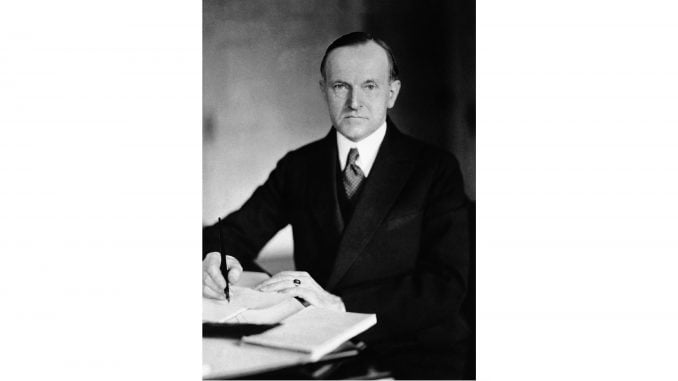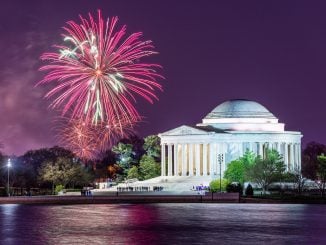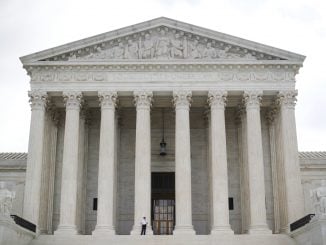
 We meet to celebrate the birthday of America.
We meet to celebrate the birthday of America.
Amid all the clash of conflicting interests, amid all the welter of partisan politics, every American can turn for solace and consolation to the Declaration of Independence and the Constitution of the United States with the assurance and confidence that those two great charters of freedom and justice remain firm and unshaken.
We are obliged to conclude that the Declaration of Independence represented the movement of a people. It was not a movement from the top. Revolutions do not come from that direction. The American Revolution represented the informed and mature convictions of a great mass of independent, liberty-loving, God-fearing people who knew their rights, and possessed the courage to dare to maintain them.
There is something beyond the establishment of a new nation in the Declaration of Independence which has ever since caused it to be regarded as one of the great charters that not only was to liberate America but ennobled humanity everywhere.
It was not because it was proposed to establish a new nation, but because it was proposed to establish a nation on new principles, that July 4, 1776, has come to be regarded as one of the greatest days in history.
Three very definite propositions were set out in its preamble regarding the nature of mankind and of government. These were the doctrine that all men are created equal; that they are endowed with certain inalienable rights; and that the source of the just powers of government must be derived from the consent of the governed.
If no one is to be accounted as born into a superior station, if there is to be no ruling class, and if all possess rights which can neither be bartered away nor taken from them by any earthly power, it follows that the practical authority of the Government has to rest on the consent of the governed.
In 1638, Rev. Thomas Hooker of Connecticut said in a sermon:
“The foundation of authority is laid in the free consent of the people.
“The choice of public magistrates belongs unto the people by God’s own allowance.”
Rev. John Wise of Massachusetts published treatises in the early 1700s that have been declared to have been a textbook of liberty for our Revolutionary fathers.
His words were carried on with a missionary spirit which did not fail to reach the Scotch-Irish of North Carolina as well as the neighborhood of Thomas Jefferson, who acknowledged that his “best ideas of democracy” had been secured at church meetings.
George Mason prepared the Virginia Declaration of Rights on May 27, 1776, which asserted popular sovereignty and inherent natural rights but confined the doctrine of equality to the assertion that “All men are created equally free and independent.”
In 1710, Wise said “Every man must be acknowledged equal to every man.” Again, “The end of all good government is to cultivate humanity and promote the happiness of all and the good of every man in all his rights, his life, liberty, estate, honor, and so forth.” And again, “For as they have a power every man in his natural state, so upon combination they can and do bequeath this power to others and settle it according as their united discretion shall determine.” And still again, “Democracy is Christ’s government in church and state.”
Placing every man on a plane where he acknowledged no superiors, where no one possessed any right to rule over him, he must inevitably choose his own rulers through a system of self-government. This was their theory of democracy.
In those days such doctrines would scarcely have been permitted to flourish and spread in any other country. These great truths were in the air that our people breathed.
Whatever else we may say of it, the Declaration of Independence was profoundly American.
In its main features, the Declaration of Independence is a great spiritual document. It is a declaration not of material but of spiritual conceptions. Equality, liberty, popular sovereignty, the rights of man — these are not elements which we can see and touch.
They are ideals.
They have their roots in religious convictions. They belong to the unseen world. Unless the faith of the American people in these religious convictions is to endure, the principles of our Declaration will perish. We cannot continue to enjoy the result if we neglect and abandon the cause.
Governments do not make ideals, but ideals make governments.
If all men are created equal, that is final. If they are endowed with inalienable rights, that is final. If governments derive their just powers from the consent of the governed, that is final.
No advance, no progress can be made beyond these propositions. If anyone wishes to deny their truth or their soundness, the only direction in which he can proceed historically is not forward, but backward toward the time when there was no equality, no rights of the individual, no rule of the people.
Those who wish to proceed in that direction cannot lay claim to progress. They are reactionary. Their ideas are not more modern, but more ancient, than those of the Revolutionary fathers.
Ours is a government of the people. It represents their will. Its officers may sometimes go astray, but that is not a reason for criticizing the principles of our institutions. The real heart of the American Government depends upon the heart of the people. It is from that source that we must look for all genuine reform.
Under a system of popular government there will always be those who will seek for political preferment by clamoring for reform. There is far more danger of harm than there is hope of good in any radical changes.
The Declaration of Independence is the product of the spiritual insight of the people. We live in an age of science and of abounding accumulation of material things.
These did not create our Declaration. Our Declaration created them.
The things of the spirit come first. If we are to maintain the great heritage which has been bequeathed to us, we must be like-minded as the fathers who created it. We must follow the spiritual and moral leadership which they showed. We must keep our ideals replenished, that they may glow with a more compelling flame.
(abridged, modernized version of Coolidge’s speech. Coolidge is the only US president to have been born on the Fourth of July. John Adams and Thomas Jefferson both died within hours of each other on the Fourth of July in 1826, 100 years before Coolidge’s 1926 speech)


